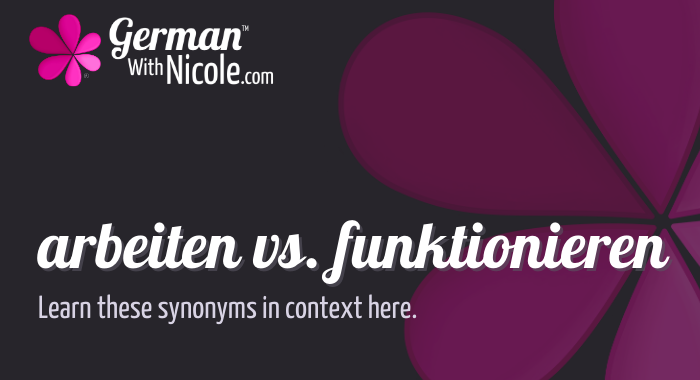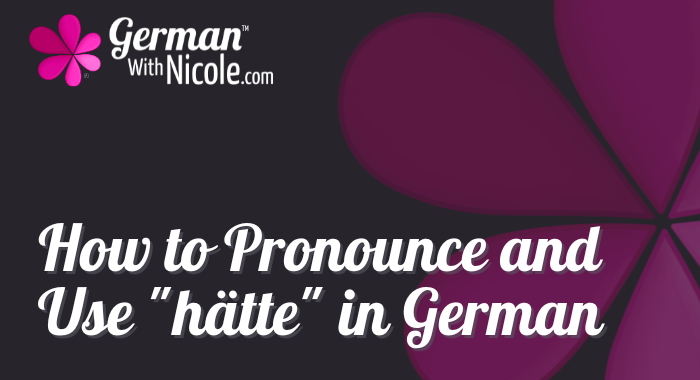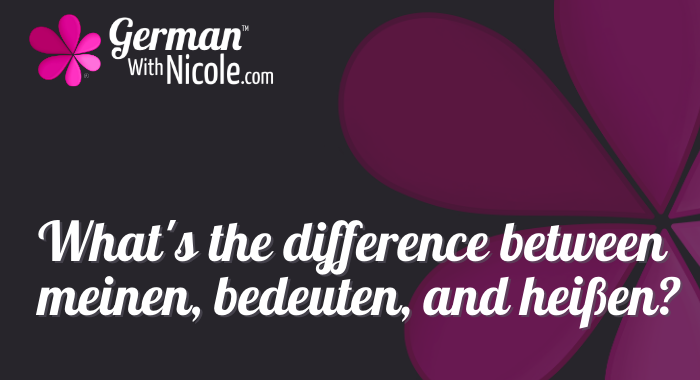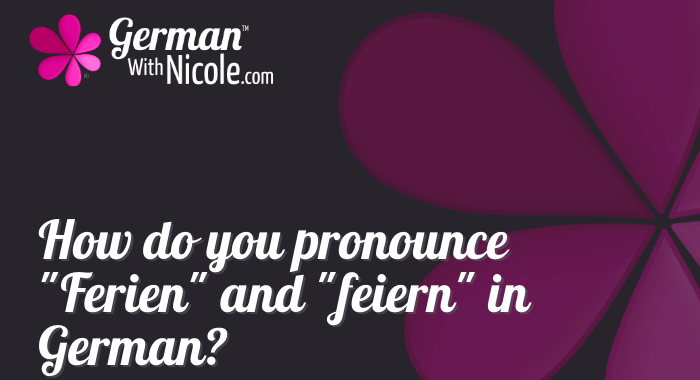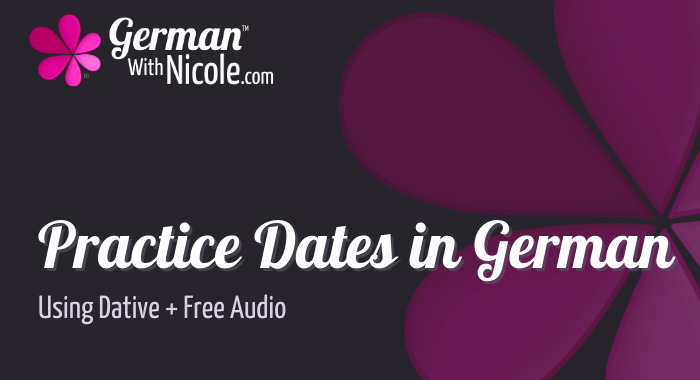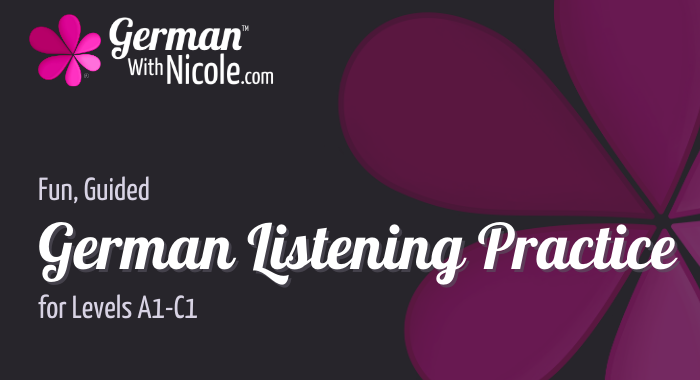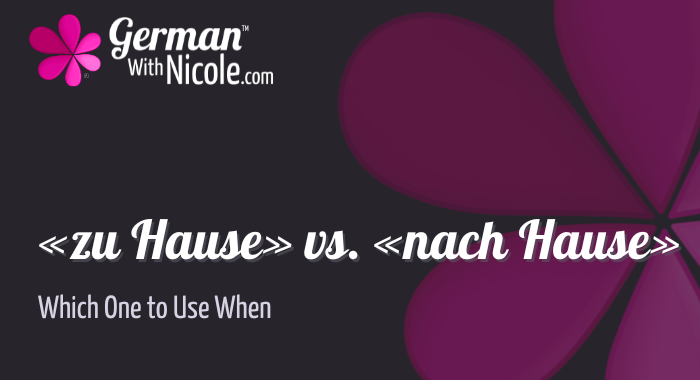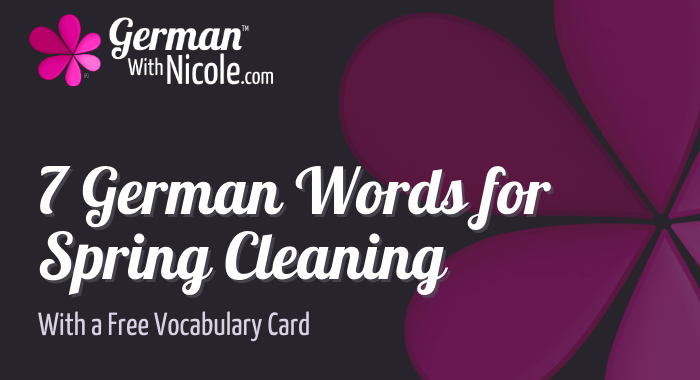Good ol'-fashioned RSS Feed
das Blog
A1
arbeiten versus funktioneren
When should you use 'arbeiten' and when should you use 'funktionieren'?
All the answers are in this episode!
You'll learn these two verbs in the context of wine harvest, too, because it's wine harvest time.
Learning to differentiate synonyms in German works really well when you use context.
This way you can easily build a picture in your mind that will help you for all of your German learning.
If it helps, you can even draw yourself a little sketch of a scene you'll hear in this episode.
A…
How to Pronounce and Use hätte in German
Knowing how to pronounce hätte correctly in German is one thing. Using it correctly is another.
In today's German lesson you'll learn both how to say hätte correctly and how to use it in a few specific phrases.
Imagine how confident you'll feel knowing exactly what to say and pronouncing everything correctly. This will be a step up for your German.
Plus you'll learn how to say "shoulda, woulda, coulda" in German, which uses hätte, and will surely impress your German friends the next time they…
What's the difference between meinen, bedeuten, and heißen?
Synonyms in German function differently--they overlap differently--than in English.
Well, of course they do, right? Because it's a different language.
A lot of German learners - A1, A2 and B1-level learners confuse the verbs meinen, bedeuten, and heißen because in English they all mean "to mean."
bedeuten = to mean
heißen = to mean (also means "to be called," which you'll hear as well today)
meinen = to mean
UGH!
The good news is, there are ways to tell them apart and you'll learn them in…
How do you pronounce "Ferien" and "feiern" in German?
Summer vacation (or summer holidays) are drawing to a close for loads of people in the northern hemisphere.
So what are these called in German?
Das sind die Ferien.
And why is that word so frequently confused with "feiern"?
Because they are so similar.
In this episode of the GermanWithNicole.com podcast you'll learn how to pronounce these two words, which article you should use with Ferien (it's simpler than you might think), and a couple of example sentences so you can remember which word …
What is A1, A2, B1, B2, C1, C2 in German learning?
In this 5th episode of the GermanWithNicole.com Podcast you'll learn what these designations mean for German learning.
You've surely seen this alphabet-number combination on German learning materials and maybe you've seen or taken a German language assessment test and received one of these combinations as a result. “You can take a class at the A2 level.”
But what does it mean?! And why should you care?!
Hint: Understanding these combinations will make your German learning life sooooo much eas…
Practice Dates in German Using Dative, With Free Audio
N.B. While the GermanWithNicole.com Podcast no longer exists, you can still hear all of the audios here on the blog. The audios are available on the blog posts published between August 1, 2021 and October 1, 2024. Viel Spaß beim Hören!
Ihre Aufgabe:
Your task is to listen to the audio below and to note which dates the first three episodes will be released (auf Deutsch, natürlich) and then how often new episodes will be published after that.
All of these numbers are under 20. You'll need to…
Fun, Guided German Listening Practice
If you're looking for listening practice at your level of German, you can now find it in Stube Radio, real German news audios (real German news, but only on pleasant topics) made personally by Frau Warner. There is a PDF transcript for you to download and keep (if you like).
What Stube Radio ISN'T
The most important thing for you to understand is that Stube Radio ISN'T news articles based on the horror-show of the day. It's not some super bored dude reading off the news at a very slow tempo wh…
"zu Hause" vs. "nach Hause"
The difference between "zu Hause" vs. "nach Hause" easily trips up German learners, but it doesn't have to trip you up if you use the tips below.
1. "zu Hause" = (at) home
"zu" is usually used as a preposition, so it would stand by itself and you might think that "zu Hause" means "to home."
This is an exception.
When you say "zu Hause," you're really using it as one block of language.
Think of the sentence "Ich bin zu Hause" and picture it like three wooden blocks:
[Ich] [bin] [zu Ha…
5 Top Tips to Help You Speak German More Easily
Erfolg hat drei Buchstaben: t u n ![1]
~Johann Wolfgang von Goethe
Success has two letters: do!
To be successful at speaking German, you need to speak, and trying to speak without any form or specific goal makes it more difficult. It’s important to give yourself a specific task or framework for speaking.
Most people simply try to talk about everything all the time. That won't help you. Why? Because you know a TON of English/whatever your native language is, however in a foreign language …
7 German Words for Spring Cleaning
Der Frühlingsputz ist ein Muss.
Spring cleaning is a 'must.'
It's not always a lot of fun, however it could be more interesting if you learn the German words for what you do.
Here are 7 words and phrases (including 6 verbs!) to help you learn German as you do your Frühlingsputz.
You can download the vocabulary card and print it out.
You could even use it as a checklist for your Spring cleaning.
Warum nicht?
If you like to do parts of your Spring cleaning over a couple of weekends, you cou…
Categories
- A1 (69)
- A2 (54)
- B1 (45)
- B2 (23)
- C1 (21)
- Deutsch lernen (78)
- Einkaufen (15)
- Essen (11)
- Grammatik (24)
- Hören (13)
- Landeskunde und Kultur (48)
- Lesen (11)
- Musik (5)
- Nachrichten (4)
- Podcast (55)
- Pronunciation (3)
- Schreiben (3)
- Schwäbisch (4)
- Spiele und Spaß (Games and Fun) (12)
- Sprechen (12)
- Vokabeln (38)
- Video (12)
Would you like to hear about future German classes with Frau Warner?
With the E-Post, you'll receive information on German class registration and goings-on in German classes, all written by Frau Warner. You'll receive an email on Tuesdays, plus an extra email or two when class registration opens or there's something new.
If you use Gmail: please check your "promotions" folder.
